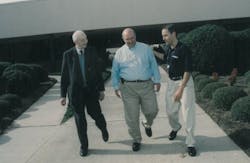Francois Michelin Addressed Big Questions in Book ('And Why Not?')
Business management books are a dime a dozen. Some are great. Some are not-so-great. I happen to enjoy books written by - or about - tire dealers. But up until recently, I had never read a tire industry-related book quite like “And Why Not? Morality and Business.”
Published in 2003, the book is a collection of interviews with Francois Michelin, who had retired as one of Groupe Michelin's three managing directors around a year earlier. The interviews were conducted by a pair of journalists, Ivan Levai and Yves Messarovitch. (Neither Ivan nor Yves were affiliated with MTD, by the way.)
Michelin, age 77 at the time, commented on a wide range of subjects - from the definition of capitalism and the role of government in business to globalization (a relatively new buzzword then), how to treat customers and employees, the importance of civic responsibility and more.
Here are some stand-out quotes, selected from many:
On the most important person within any company: "I have often asked people outside our company who they thought was the most important individual in it. Their answers take on the coloring of their respective political or social opinions. For some, it is the employer. For others, it is the worker or the supervisor. 'You are mistaken,' I say to them. 'The most important individual is the customer.'"
On competition: “There are times when you are tempted to crush the competition, but it often cannot and should not be done because behind every business there are people. And also, as you know quite well, a customer who has only one supplier stops using his brains. The absence of competition leads to a phenomenal loss of substance.”
On the nature of transactions: "When a person spends money, he is totally involved in his purchase. The act of purchasing is a free and responsible action - one that involves the whole personality. It is an eminently formative act."
On hierarchies within businesses: “The boss who is the boss’ boss - the pyramidal structure that fouls everything up!"
On the concept of “giving back:” “Saint Thomas Aquinas is quite definite on this point: ‘Riches that lie idle are like stagnant water at the bottom of a cistern.’ Everyone should put his or her talents at the service of others, whether these talents be intellectual, emotional, artistic or monetary.”
On why the customer is not always right: “I am not terribly enamored of the notion of the customer being king. You cannot always discuss matters with a king. And you have to be able to discuss things in order to reach an understanding. You cannot do anything with a customer who says, ‘Get lost!’ So you have to find a way for him to say ‘yes’ to you. And this is only possible if what you are offering him corresponds to what he needs.”
On where good ideas come from: “It seems to be that innovation is always spontaneous if the human environment is favorable. Good ideas can be conceived anywhere: in the workshop, in the office, with customers, etc.”
On the rewards of commerce: “A just reward is one that allows both the business and the people involved to grow. The buying power of personnel is a key component in the economic well-being of a country.”
The ultimate goal of economic development, he said, “is to show man that there is something that transcends him.”
There are still copies of “And Why Not?” in circulation. It's a fascinating and worthwhile read.




